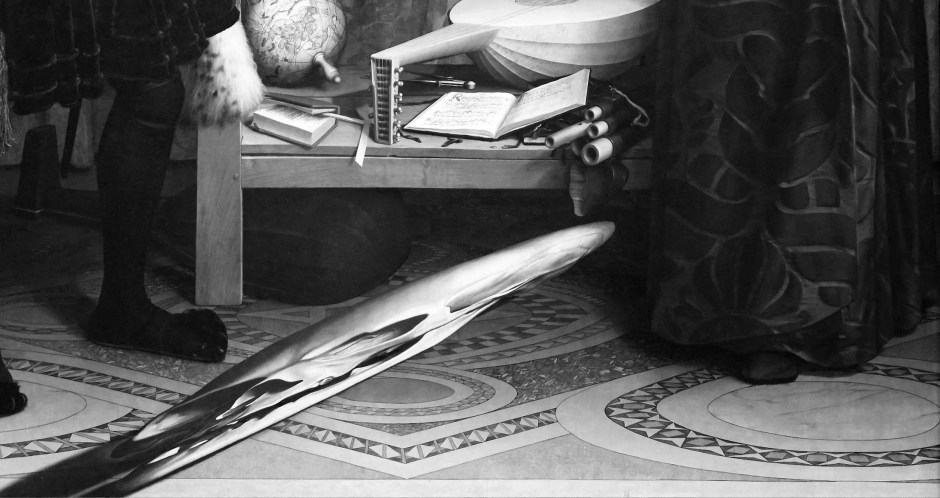Electrons Do Not Flow Like Water
What a relief it is to learn I’m not what I think.
And neither is my dog, with thoughts of his own that aren’t him.
Also helpful is hearing that spacetime distorts in such a way
that the shortest distance between two points is a curve,
which helps explain the appeal of riddles and jokes
and why a clock held close to the heart ticks more slowly.
As mentioned above, electrons do not flow like water. More like rumor.
They nudge their neighbors, who in turn nudge theirs.
This has nothing to do with the game of Mobius Strip Poker, in which
the player with the losing hand removes the same garment
endlessly, but I can’t help thinking of it. On the other hand, distortions
of spacetime might have something to do with “joint mice,”
those bits of cartilage that break off inside the capsule of the knee,
that make the knee catch, depending where they lodge,
or why when looking at The Ambassadors the viewer must take a position
sharply askew in order to see the death’s head for what it is,
which is often how we look at disturbing things, from off to one side, if at all.
Well, OK. Perhaps The Ambassadors has nothing to do with spacetime
or its distortions. Painted in 1533, it preceded Einstein by nearly four centuries.
Thoughts about spacetime may never have crossed the artist’s mind.
In the Aggregate
The weather gunned its engine, sending up a plume
of transmissions, strong verbs that rattled the manifold.
So this must be where the noise is coming from. No matter.
It’s only a crisis if you don’t know what to do, or do and don’t do it.
The blood moon throws up its arms. Best to follow the example
of a snowy egret stepping through slough sedge.
But tell me, badger of the mind, why are poisons and their antidotes
so alike? Look how they keep us in gammon, lashed to a bowsprit.
We remember past performances, running on the beach at night
like grunion, naked as nudibranchs,
the awkward angles at which we held our limbs,
the surf, nonchalant, siphoning the sand from beneath our feet.

John Johnson’s poems and translations have appeared in many print and online journals. He is co-translator, with Terry Ehret and Nancy J. Morales, of Plagios/Plagiarisms, the poetry of Ulalume González de León, winner of the 2021 Northern California Book Award for poetry in translation. You can find more of John’s work at poemalog.tumblr.com.


